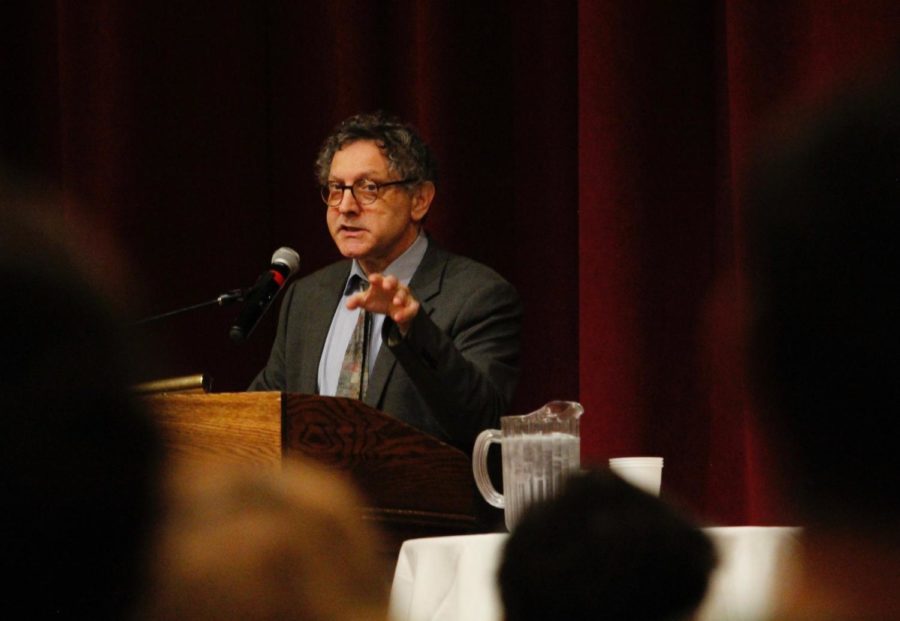Pulitzer Prize-winning journalist Fred Kaplan discusses cyberwarfare
Fred Kaplan, a journalist who writes a national security column for Slate, speaks at The History and Politics of Russian-American Hacking lecture on April 18, 2017. Kaplan was a 2014 Pulitzer Prize finalist for his book “The Insurgents: David Petraeus and Plot to Change the American Way of War.”
April 18, 2017
Hacking can be as individual as your smart phones and as broad as presidential campaigns, according to Fred Kaplan.
Kaplan, who has a doctorate in political science and is a Pulitzer Prize-winning journalist and author, gave a brief historical account of cyberwarfare in United States and international relations. He also discussed how this method of defense and offense came to be and what can be done about it.
Kaplan is currently Slate magazine’s national security columnist but has written for The Boston Globe, The New York Times, The Atlantic, The New Yorker and Foreign Affairs.
He has also written five books, including “Dark Territory: The Secret History of Cyber War,” in which he details even further the story of how cyberwarfare became what it is today.
Cyberwarfare is “as old as the internet itself,” Kaplan said. “It’s embedded in the technology.”
Kaplan said that this embedding of critical infrastructure in the original technology leads to inherent fragility and vulnerability.
On the individual level, Kaplan said, “The danger is that we’re all turning our houses into bot armies.”
With more and more “smart” devices — from cellphones to thermostats to cars — rising in popularity, the networks that people are a part of keep growing, opening more avenues for hackers to use. One example is phishing, which uses false emails to trick users into downloading malware.
The average amount of time between a device being hacked and the discovery of this is about seven months, Kaplan said.
“We have to be more aware of this kind of stuff,” Kaplan said.
However, Kaplan said, “Most people who are coming after your stuff, they don’t care about you. They’re just trolling.”
In this case, Kaplan said, people should change their passwords to randomized combinations and express their concerns to members of Congress.
But if a person has something that someone else really wants and values, and especially if it’s a nation-state that wants what they have, there’s really nothing they can do about it, Kaplan said.
One of the earliest detections of hacking in the U.S. government military facilities, “Solar Sunrise,” was done by a couple of kids from suburban California, Kaplan said.
“If two kids from California can do this, what can a nation-state do?” Kaplan said.
This inquiry was soon answered in a new investigation called “Moonlight Maze.” Kaplan said this investigation of advanced persistent threats traced back to the Russian Academy of Sciences.
Advanced persistent threats are attacks on a network by unwanted parties, often remaining undiscovered for long periods of times, and sometimes able to cover the attackers’ tracks.
“There’s really probably nothing to be done about it, but I think we can get smart about it,” Kaplan said.
These cyber attacks, Kaplan said, aren’t preventable, but detection and elimination are avenues that must be explored.
“Nothing has been done really to cure this problem,” he said.
Part of that, Kaplan said, is because there is no cure, but also due to a lack of that knowledge and awareness of the issues at hand.







